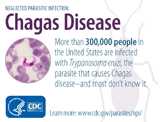
Chagas disease is named after the Brazilian physician Carlos Chagas, who discovered the disease in 1909. It is caused by the parasite Trypanosoma cruzi, which is transmitted to animals and people by insect vectors and is found only in the Americas (mainly, in rural areas of Latin America where poverty is widespread). Chagas disease (T. cruzi infection) is also referred to as American trypanosomiasis.
In the United States, Chagas disease is considered one of the neglected parasitic infections (NPI), a group of five parasitic diseases that have been targeted by CDC for public health action.
Image: L&R: Various species of Triatomine bugs, which if infected can transmit T. cruzi. Center: T. cruzi trypomastigote in a thin blood smear stained with Giemsa. Credit: DPDx
- Page last reviewed: May 24, 2016
- Page last updated: May 24, 2016
- Content source:



 ShareCompartir
ShareCompartir